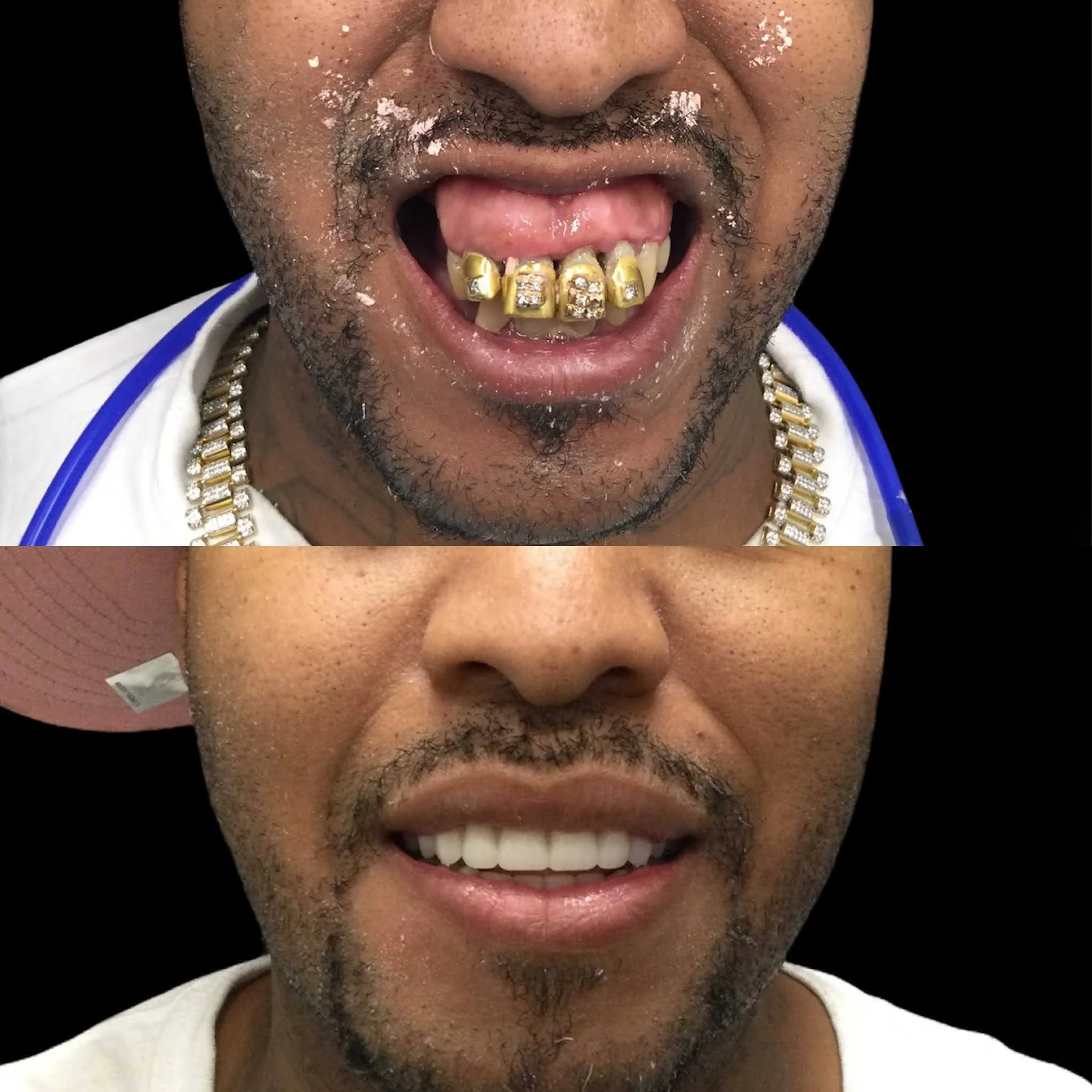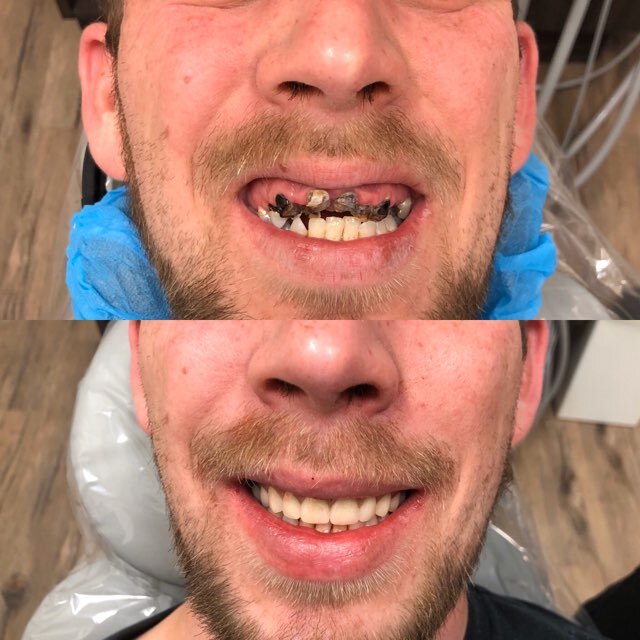Immediate dentures.
No waiting for your new smile!
Worried about having to go in public without teeth while you heal from extractions?
Problem solved! We offer same-day immediate dentures. Keep reading to find out more!
What are the advantages of immediate dentures?
Help control swelling
Help control bleeding
Help you start getting used to dentures right away. The alternative is getting used to being without teeth while your extraction sites heal, then still having to learn to function with dentures once you’re healed.
Again, no need to go without teeth. Leave our clinic with new teeth the same day your old teeth are removed.
What are immediate dentures?
These are dentures which are placed immediately following the removal of your remaining natural teeth, either upper, lower, or both. They’re made in our on-site denture lab, which means no long waits without teeth. At Memphis Dentures and Implants, we also include a package to help you adjust to and function with your dentures as you heal from your procedure. This includes a series of soft linings / soft re-fittings and a final long-term re-fit after you have finished healing.
Immediate denture levels
Premium - $3,298 set / $1,649 single denture
Strongest, most durable teeth
Most life-like appearance
Most stain resistant
6 year warranty
Select - $2,498 set / $1249 single denture
Stronger, more durable teeth
More life-like appearance
Increased stain resistance
4 year warranty
Standard - $1,898 set / $949 single denture
Stronger, more durable teeth
More life-like appearance
Increased stain resistance
2 year warranty
Basic - $1,498 set / $749 single denture
Basic durability
Basic stain resistance
Most affordable
1 year warranty
Frequently asked questions - FAQs
What are immediate dentures?
As the name implies, immediate dentures are those which are placed immediately after your natural teeth are taken out. They help control swelling and bleeding; they act like bandages over your extraction sites.
What is the process for getting immediate dentures?
The process typically takes 6 months, but can take longer for some patients.
- Impressions are taken before your procedure with your natural teeth still present. From these impressions, your dentures are fabricated.
- Procedure – your teeth are removed and your new teeth are placed.
- Series of soft liners (soft re-fittings) over 6 month healing period.
- Final re-fit (processed hard reline) at end of 6 month healing period.
What is it like getting used to immediate dentures?
The experience will be different for each patient, but it does require patience and practice. Your mouth will be going through significant changes over the 6 month healing phase. Remember, it does get easier with time and we are here for you throughout the process.
How do I chew with my new dentures?
Cut your food up into small pieces, chew small bites, and chew with food on booth sides of your dentures to even out your bite.
My dentures feel like they’re getting loose?
This is normal with immediate dentures. Your gums and jaws will shrink down after extractions. This leaves space between your dentures and gums. We place soft liners in your dentures to fill in this extra space. This should help them fit and feel better as you heal.
My lower denture is difficult to function with. Is this normal?
Yes, lower dentures are more difficult to function with than upper dentures. The movements of your tongue and cheeks tend to push and pull on your lower denture and dislodge it. Talk with your doctor to see if you’re a candidate for lower implants. They help tremendously with lower denture fit and function.
I can’t taste as much with my dentures. Is this normal?
Yes, the palate of a full upper denture covers the taste buds on the roof of the mouth reducing your taste sensitivity.
How do I care for my dentures?
- Clean them daily with antibacterial hand soap and either a denture brush or a very soft bristled tooth brush
- Store them in water when not in use
What do I use to clean my dentures?
- Either denture cleaner or antibacterial handsoap and either a denture brush or very soft bristled tooth brush. Scrub them at least once a day
- Soak them in a denture cleanser (optional)
- Ultrasonic cleaner
Should I take my dentures out when I sleep?
Yes, we do recommend taking your dentures out when you sleep and also whenever you can throughout the day. This gives your gums time to “rest” and get natural, cleansing saliva flow to them. Also, if you naturally grind your teeth, taking your dentures out will help you increase their usable life significantly.
Can I boil my dentures to clean them?
No! Do not boil your dentures to clean them. The heat can warp your dentures. If this happens, you will have to replace them.
Can my dentures be damaged?
Yes, your dentures are made from acrylic teeth and an acrylic base. While these materials are very strong, they can be damaged. Be careful not to drop your dentures, especially onto porcelain sinks, ceramic tiles, etc.
One of the most common ways dentures are damaged beyond repair is when a dog (or sometimes cat) gets ahold of them. Pets and animals love to chew on dentures and can often damage them beyond repair very quickly. Be extra careful to put your dentures up where your pet can’t get to them.
If my dentures are damaged, can they be repaired?
Yes, in most cases they can. One of the great features of acrylic dentures is the ease and affordability of repairing them compared to other materials. And in most cases, repairs can be completed the same day.
Will there be pain after the procedure?
While experiences will vary, you should expect some discomfort and possibly swelling after your procedure. Many patients come in the next day for their post op appointment reporting very little discomfort. You will be prescribed pain medication to help alleviate any discomfort.
Why am I salivating (drooling) so much?
This is completely normal when you first have a prosthesis placed in your mouth. Your body senses it as a foreign object and is trying to “flush” it out. This increased salivation should subside within 2-3 days.
Can I be put to sleep for my procedure?
We do not currently put patients to sleep, however, we do offer oral conscious sedation. This medication will help to relax you and often makes it so you don’t even remember your procedure. For this, we write you a prescription, and you can pick it up at your pharmacy of choice. NOTE: You MUST have a driver for this procedure, someone who can drive you after you have taken your oral sedation pill(s). You MUST NOT operate a motor vehicle or any machinery after taking your medication.
Will I know how to eat with my new teeth right away?
Just as you would need practice in order to get used to functioning with a prosthetic leg, it will require some practice and patience to get used to your prosthetic teeth. Patience and practice are the keys to improving with your new dentures as quickly as possible.
Will I know how to speak with my new teeth right away?
Again, this will take a little time, but with some patience and practice, your mouth and tongue will quickly adjust. S’s will be the toughest to pronounce. Practicing words like “Mississippi” and “sixty six” will help you get used to your new teeth. In some cases, patients may have a slight lisp long term with dentures.
Can food get under my dentures(s)?
Yes, any prosthetic in the mouth will get some amount of food under it. The convenient thing about dentures is how easy they are to clean. Just take them out; clean the denture(s) and your gums; and place them back in.
How long should I take off work for recovery after my procedure?
Every patient is different. Some return to work the next day, others wait a week or two. Since there is always the chance of bruising and swelling, and you’ll need to get used to eating and speaking with your new teeth, the longer you can take off, the better.
What is a soft liner?
A soft liner is a cushion that is placed in your denture throughout the healing process. It fills in the spaces that are created as you heal helping your dentures to fit and feel better.
I feel like I’m too young for this procedure?
No, this is not just a procedure for the elderly. It’s actually quite common for people in their 40s, 30, even 20s to need to replace their teeth. Replacing bad teeth can be hugely beneficial to your overall physical health, and being able to smile, laugh, and converse confidently with teeth you’re proud of can be hugely beneficial to your emotional health. Again, needing to replace teeth early in life is not uncommon at all.
What items should I have ready for after my procedure?
- ice packs
- wash cloths you don’t mind throwing away
- comfortable clothes you don’t mind throwing away
- soft foods such as:
- soups
- yogurt
- cottage cheese
- smoothies
- protein shakes
- eggs
- mashed potatoes (gravy optional)
Can I have the palate (middle part that covers roof of mouth) removed from my denture?
The majority of the palate of the denture needs to stay. Cutting this out removes a great deal of stability and almost all of your natural suction. A good portion of the palate can be removed for patients with denture implants. Click here for more info.
What is alveoloplasty? Why is it important?
Alveoplasty is a procedure where the doctor contours your jawbone. This procedure is important because it can significantly improve the fit and comfort of your dentures.
What are tori? Do they need to be removed?
Tori are bony knots that develop in the mouth of many patients. They are not harmful, however, they can prevent your denture(s) from fitting comfortably, so your doctor will often recommend having them removed.
Why am I salivating (drooling) so much?
This is completely normal when you first have a prosthesis placed in your mouth. Your body senses it as a foreign object and is trying to “flush” it out. This increased salivation should subside within 2-3 days.
How long will I bleed after the procedure?
Significant bleeding will have stopped before you leave the clinic, however, expect to have some slight bleeding (oozing) for 1-3 days after the procedure. In addition, you will most likely notice increased salivation when we first put your temporary teeth in. When this increased saliva mixes with a little blood, it can look like a lot of blood. If heavy bleeding continues, please call the office.
An old home reemedy that still works really well to help clotting and stop bleeding is the use of tea bags. Just get a regular tea bag, get it damp, ring out the excess water, place it on your extraction site or sites, and the tea bags will help you clot. Multiple tea bags can be used if needed. Replace the tea bags as they get saturated with blood. This process can be repeated as many times as you need.
Will my dentures rock?
Yes, this is possible. Dental implants can provide the stability that is missing with dentures alone. Click here for more info.
Denture adhesive can also be helpful for some patients.
I can’t stand having the roof of my mouth covered. What are my options?
Dental implants can provide the stability you need. Click here for more info.
Are immediate dentures removable?
Yes, they are removable. They come in and out of the mouth and are kept in place either by natural suction for the upper or denture adhesive. Not all patients will have natural suction with their upper denture for a number of reasons (palatal torus, flat palate, bone loss, etc.)









